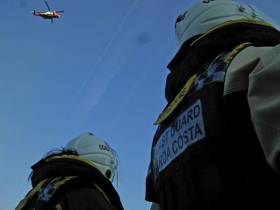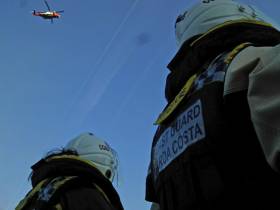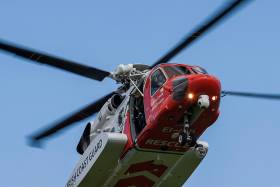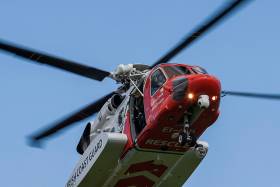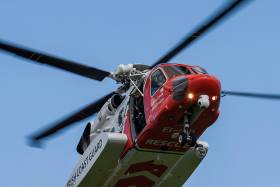Displaying items by tag: AAIU
‘Months’ Before Final Report On Rescue 116 Is Completed
As the second anniversary of the Rescue 116 tragedy approaches, it has emerged that a draft final report into the incident is still months away from completion, according to the Irish Examiner.
The four crew of the Sikorsky S-92 search and rescue helicopter were lost after the crash at Blackrock island off Co Mayo on 14 March 2017.
As previously reported on Afloat.ie, Capt Dara Fitzpatrick died shortly after she was recovered from the scene. The body of Capt Mark Duffy was recovered almost two weeks later. Winch operator Paul Ormsby and winchman Ciaran Smith were lost at sea.
The latest news from the Air Accident Investigation Unit (AAUI) was an interim statement released almost a year agostatement released almost a year ago, which called for “a thorough review of search and rescue aviation operations in Ireland”.
Recommendations from a subsequently commissioned oversight review were accepted by Transport Minister Shane Ross in September last year.
The AAIU has now confirmed that a second interim statement will not be published by 14 March this year, citing work on a draft final report being “at an advanced stage”.
The Irish Examiner has more on the story HERE.
Minister Accepts Recommendations Of Report On Irish Search & Rescue Oversight
#SAR - The report of a team appointed to review “oversight” in Ireland’s search and rescue aviation operations has been published.
Among its short-term recommendations is that the Department of Transport, Tourism and Sport (DTTAS) “formally and clearly assigns” the Irish Aviation Authority (IAA) “with responsibility for the legal and safety oversight” of civil aviation SAR.
In the medium term, it is recommended that the IAA be directed to develop “clear and unambiguous” regulatory material for SAR “that is appropriate to the scale and complexity of the national aviation system”, and that roles and responsibilities are “assigned appropriately … [with] a consistent, shared understanding”.
The report says it is “evident that the regulatory arrangements for search and rescue are a hybrid of maritime and aviation depending on which assets are deployed and in what circumstances.”
But it also stresses that Ireland “is not exceptional” in this regard, and that its recommendations show “learnings which will be relevant to other jurisdictions”.
Transport Minister Shane Ross has considered the report and accepts in full its 12 recommendations.
The review was conducted as a direct response to the Air Accident Investigation Unit’s (AAIU) interim statement in March as its own investigation into the Rescue 116 incident remains ongoing after more than a year due to its “depth and breadth”.
An international team of aviation and SAR experts worked on the report, which was completed in early August and submitted to the AAIU along with a series of follow-up actions to ensure full implementation of the its recommendations.
The AAIU says it has had an opportunity to consider the report in the context of its “wide-ranging investigation into the R116 accident and is happy that its publication does not jeopardise any other element of its ongoing investigation.”
As the report states, the review did not examine the specific circumstances in relation to the Rescue 116 accident and as such, there is no intention to establish any causal link between their findings and the accident.
Speaking upon the publication of the report today (Friday 21 September), Minister Ross said: “I have instructed that all necessary steps be taken without delay to ensure speedy implementation of all of the recommendations.
“As the report explains, search and rescue oversight and regulation is a complex matter, and international regulation is still endeavouring to keep pace with practice on the ground.
“However, we now have an opportunity in Ireland — and a blueprint – to make meaningful improvement to our current oversight structures, and in doing so set a benchmark for other jurisdictions.”
The minister said he will continue to provide updates to the AAIU on the progress in implementing these actions.
The report is available as a PDF to read or download from the DTTAS website HERE.
Irish SAR Review Points To Confusion Among Agencies
#SAR - A team appointed to review Irish search and rescue operations in the wake of last year’s fatal Rescue 116 crash has identified “several sources of confusion and potential conflicts of interest among the agencies involved”.
RTÉ News reports on the as-yet unpublished report from an international panel of aviation and SAR experts appointed earlier this year by Transport Minister Shane Ross.
The panel did not examine the Rescue 116 crash at Blackrock, which is subject to its own report, and was tasked only with reviewing matters in relation of “oversight” of Irish SAR operations.
Their report says that confusion over the roles of the various agencies involved in civil aviation SAR has “resulted in a lack of shared understanding of roles and responsibilities”.
RTÉ News has more on the story HERE.
Ross Appoints Team To Review Search & Rescue ‘Oversight’ In Wake Of Rescue 116 Tragedy
#Rescue116 - Transport Minister Shane Ross has appointed an international team to review Irish SAR operations in the wake of last year’s fatal Rescue 116 crash, as The Irish Times reports.
The team, led by former European Aviation Safety Agency rulemaking director Prof Jules Kneepkens, includes former Bristol Helicopters coastguard SAR commander Rowan Greenwood, and Milen Dentchev, safety oversight auditor with the International Civil Aviation Organisation.
They have been given two months to report back to the minister with their findings.
The appointment follows March’s interim report from the Air Accident Investigation Unit (AAIU) into the tragedy at Black Rock off Co Mayo on 14 March 2017, which cost the lives of four experienced Irish Coast Guard personnel.
Capt Dara Fitzpatrick was recovered at the scene but died shortly after. The body of Capt Mark Duffy was found almost two weeks later, while winch operator Paul Ormsby and winchman Ciaran Smith were not recovered.
As previously reported on Afloat.ie, the AAIU called for “a thorough review of search and rescue aviation operations in Ireland” as its own investigation into the Rescue 116 incident remains ongoing after more than a year due to its “depth and breadth”.
Minister Ross says the review’s term of reference will “take account of the various findings made in the AAIU’s interim statement in relation to oversight.”
The Irish Times has more on the story HERE.
Interim Statement On Rescue 116 Tragedy Calls For ‘Thorough Review’ Of Irish SAR Operations
#Rescue116 - The Air Accident Investigation Unit has called for “a thorough review of search and rescue aviation operations in Ireland” in the wake of the Rescue 116 tragedy one year ago.
Four Irish Coast Guard crew — Capt Dara Fitzpatrick, Capt Mark Duffy, winch operator Paul Ormsby and winchman Ciaran Smith — were lost when their Sikorsky S-92A helicopter went down at Black Rock island, off Blacksod in Co Mayo, in the early hours of 14 March 2017.
The AAIU confirmed in January that due to the “depth and breadth” of its investigation into the incident, a final report would not be completed within the first year, and progress would be detailed in an interim statement.
Published on Friday (16 March) days after commemorations in Mayo for the four Rescue 116 crew, this statement called on the Minister for Transport to conduct “a thorough review” of air-based SAR “to ensure that there are appropriate processes, resources and personnel in place to provide effective, continuous, comprehensive and independent oversight of all aspects of these operations.”
The statement also highlighted an issue with the “coarseness” of position data recorded by the helicopter’s flight data recorder, suggesting upgrades or modifications “to ensure that the latitude and longitude information recorded on the Flight Data Recorder reflects the most accurate position information available during all flight regimes and mission profiles.”
And it urged coastguard helicopter operator CHC Ireland to conduct an internal review of its safety management systems, or SMS, after the investigation raised “concerns regarding its efficacy”.
Interim safety recommendations included in last April’s preliminary report remain open, the AAIU says.
Minister for Transport Shane Ross welcomed the publication of the AAIU interim statement on Friday, and said he has asked his department to ensure that the recommended review of SAR aviation operations “is instigated without delay”.
“The aim of this review will be to ensure that our arrangements in this regard are sufficiently robust and measure up to international best practice models,” Minister Ross added.
Noting the length of the investigation, the minister said it was “important to emphasise” that the AAIU’s work remains in progress.
“Whilst I understand the ongoing public interest in this matter, it is vital that the AAIU is given the time and space to complete its work and report on its findings,” he said. “As such, I am not in position to comment further on the issues surrounding it.”
“We’re Gone”: Final Moments Of Rescue 116 Show Helicopter ‘Pitched Up Rapidly’ Before Crash
#Rescue116 - The interim report from the investigation into the Rescue 116 tragedy has found that the Irish Coast Guard helicopter “pitched up rapidly” in its final seconds before crashing off Co Mayo a month ago.
Data recovered from the Sikorsky S-92’s ‘black box’ paints a terrifying picture of the seconds before the coastguard helicopter was lost at Black Rock in the early hours of Tuesday 14 March, with one of the crew calling for evasive action as the island loomed dead ahead.
Moreover, details in the Air Accident Investigation Unit’s (AAIU) preliminary report suggest the aircraft was flying using a pre-programmed route that was missing specific data relating to Black Rock, a small island east of Blacksod on the Mullet Peninsula.
Recordings from the cockpit also reveal that neither the mission commander and pilot Capt Dara Fitzpatrick nor co-pilot Capt Mark Duffy, whose lives were lost in the incident, had recent familiarity with landing in the area.
The Dublin-based coastguard SAR helicopter had been dispatched late on Monday 13 March to provide top cover for an offshore medevac being attended by Sligo’s Rescue 118.
Contact was lost with Rescue 116 as it approached Blacksod for refuelling and a search began immediately, with wreckage soon spotted off the western end of Black Rock and Capt Fitzpatrick recovered from the water within hours of the crash, though she later died in hospital.
Capt Duffy’s remains were recovered from the cockpit on the sea bed more than a week later. The search continues for their crew mates, winch men Ciarán Smith and Paul Ormsby, though after a major sweep by more than 100 fishing vessels this last weekend, the operation is now being wound down.
Rescue 116’s dual flight data recorder and cockpit voice recorder was recovered from the sea bed on Friday 24 March. Examination of the hardware revealed water damage to its memory board, requiring delicate desoldering of its circuits to recover the data, a process that is ongoing at the AAIB laboratory in the UK.
Additional data recovered from the aircraft’s Health and Usage Monitoring System (HUMS) identified no diagnostic alerts regarding Rescue 116’s critical systems or components.
Position data from the HUMS card was used to generate a placemark for what appears to be the last recorded position of the aircraft, though in its final seconds it was “subjected to complicated flight dynamics and a progressive deterioration of structural and systems integrity”.
All available data adds up to the following picture of the situation inside Rescue 116 before its loss:
- The mission commander and pilot (Capt Dara Fitzpatrick) was seated right of the co-pilot (Capt Mark Duffy) in the cockpit.
- All crew communications were mission-focused with no outside distractions.
- The helicopter routed from Dublin towards Sligo, then adjusted heading based on fuel requirements to Blacksod Lighthouse before a planned routing to the SAR mission offshore.
- After a crew briefing prior to arrival at Blacksod, Capt Fitzpatrick remarked that it has been some time since she had landed at Blacksod; Capt Duffy later said he had also not been to the area recently.
- The cockpit voice recording contains no reference by the crew to the presence of a lighthouse or terrain at Black Rock.
- The recording also indicates that Capt Duffy was using the helicopter’s weather radar to identify terrain features.
- 26 seconds before impact, the radio altitude sensor gave an aural alert, which Capt Fitzpatrick explained as “just a small little island... that’s B L M O [referring to Black Rock] itself”. Data places the aircraft at this time near an outcrop of two rocks just over half a nautical mile west of Black Rock.
- 13 seconds before impact, one of the rear crew members identified an island “directly ahead of us now guys” and suggested the helicopter should “come right” by “20 degrees”.
- Data shows the heading change was made before the rear crewman added with urgency to “come right now come right COME RIGHT”. A second later, Capt Duffy said: “We’re gone.”
- Two seconds before initial impact, data shows the helicopter pitched nose up, then after impact climbed with large changes in pitch, roll and yaw.
The recorded data, while not definitive, indicates that the flight crew was using an operator-specific route guide — a review of which is now warranted, says the AAIU.
The report also includes a recommendation to review instructions for the use of locator beacons on the Mk 44 lifejackets used by the crew, two of whom remain missing four weeks after the incident.
The AAIU investigation continues, but the preliminary report is available in full as a PDF to download below.
Update 15 April 2017: This article was changed to correct a misattribution of the final quote by Capt Mark Duffy to his colleague Capt Dara Fitzpatrick. The original article also misstated the designation of the pilot (and mission commander) and co-pilot.




























